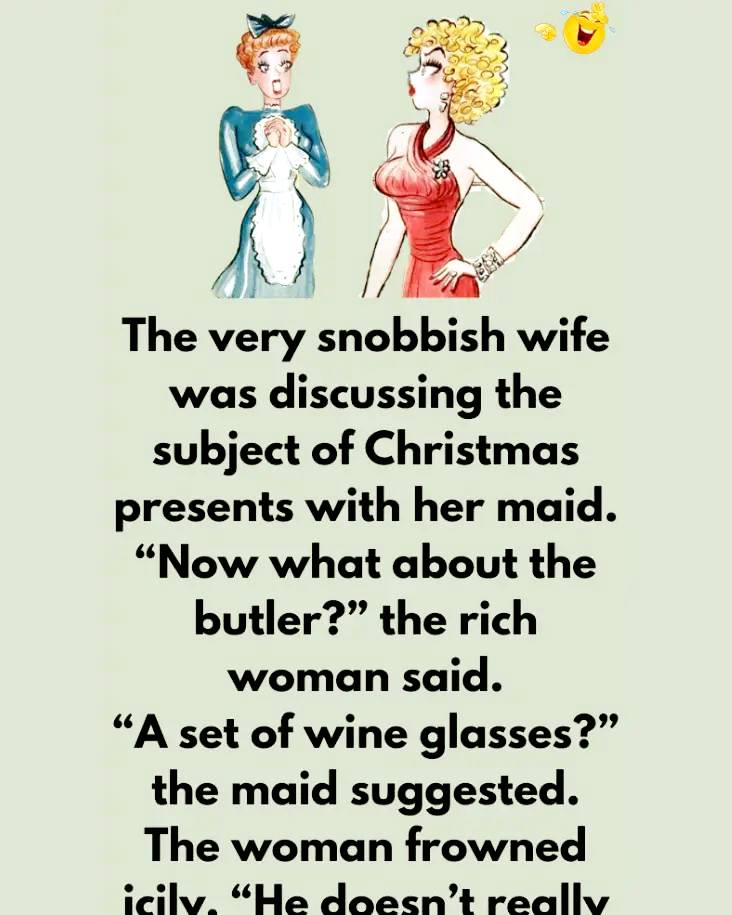Christmas is supposed to be a season of generosity, kindness, and goodwill toward others. It’s the time of year when people express gratitude and thoughtfulness through gifts. However, for one snobbish wife, gift-giving became less about spreading joy and more about maintaining appearances. But little did she know, a simple conversation with her maid would lead to an unexpected—and hilariously revealing—turn of events.
Let’s dive into this humorous yet thought-provoking tale that shines a light on arrogance, class divides, and a well-timed dose of wit.

The Snobbish Wife and Her Holiday Checklist
Picture a lavish estate, adorned with twinkling lights and wreaths, where a wealthy woman sits, pen in hand, meticulously planning the Christmas gifts for her household staff. But instead of considering thoughtful, heartfelt presents, the woman approaches this tradition with an air of superiority and condescension.
“Now, what about the butler?” she asks her maid, clearly expecting a practical suggestion.
The maid, who likely knows the butler better than anyone, thoughtfully suggests, “A set of wine glasses?”
But the woman frowns, dismissing the idea with a wave of her hand. “He doesn’t really need that. A butler never entertains. He’ll get a tie.”
It’s clear from the start that this woman values practicality and control over generosity. Her attitude is less about giving gifts that might bring joy and more about what she deems “appropriate” for each individual.
Practicality Over Compassion: The Serving Girl’s Gift
The conversation moves on to Jenny, the young serving girl in the household. Perhaps this time, the maid thinks, the lady of the house will show a glimmer of compassion. After all, Jenny works tirelessly and could use something special to brighten her holiday season.
“What about a dress for Jenny?” the maid suggests, hoping for a kind response.
But once again, the woman’s frosty demeanor prevails. “She doesn’t really need a new dress,” she declares. “She’ll only get in trouble. We’ll get her another apron.”
An apron? For Christmas? The maid suppresses her frustration, but it’s evident that the woman views her staff not as individuals with needs and desires but as tools to serve her household. Jenny’s hard work is dismissed, and instead of receiving something meaningful, she’s relegated to yet another symbol of her servitude.
A Series of Dismissals: The Pattern of Arrogance
As the conversation continues, the snobbish wife systematically vetoes any thoughtful suggestion the maid offers. Whether it’s wine glasses for the butler or a dress for Jenny, every idea is met with an icy rejection. The underlying message is clear: the staff’s happiness is secondary to maintaining the status quo.
It’s a pattern rooted in arrogance, one that reflects a larger issue of class divides. For the woman, Christmas gifts are not about generosity but about reinforcing her perceived superiority. She views her staff as mere extensions of their roles, undeserving of anything beyond the bare minimum.
But as the conversation shifts to the subject of her husband, the maid finally seizes an opportunity to deliver a much-needed dose of humility.
The Husband’s Gift: A Moment of Brilliant Wit
The maid, clearly chafing at her employer’s arrogance, approaches the topic of the husband’s gift with deliberate precision. Knowing the woman values practicality above all else, she slyly frames her response to match the tone of the conversation.
“I assume you want to get him something he really needs, madam?” the maid asks, setting the stage for her witty comeback.
The woman, oblivious to the maid’s growing frustration, replies smugly, “Of course.”
The maid delivers the punchline without missing a beat: “Then what about three more inches?”
Silence. For a moment, the room is filled with the weight of the maid’s bold remark. The implication is crystal clear, and the snobbish wife is left reeling, undoubtedly taken aback by the unexpected jab.
A Lesson in Humility and Self-Awareness
The maid’s clever quip is more than just a humorous retort—it’s a reminder of the importance of humility and self-awareness. For too long, the woman’s arrogance and condescension had gone unchecked, but the maid’s comment serves as a wake-up call. It’s a moment that highlights the absurdity of the woman’s attitude and forces her to confront the reality of her behavior.
- Challenging Superiority: The maid’s remark disrupts the power dynamic, showing that wit and intelligence are not confined to social status.
- A Call for Reflection: While the woman may not have appreciated the humor in the moment, the comment challenges her to reflect on her actions and attitudes toward others.
- Humanizing the Staff: By making the woman the subject of the joke, the maid shifts the focus away from the staff’s perceived shortcomings and underscores their humanity.
The Power of Humor in Addressing Injustice
Humor has long been a tool for addressing social inequalities and challenging those in positions of power. In this tale, the maid’s quick wit serves as a subtle yet powerful way of calling out the snobbish wife’s arrogance.
- Highlighting Hypocrisy: The maid’s comment exposes the woman’s hypocrisy—she’s quick to judge others but blind to her own flaws.
- Balancing the Scales: While the staff may lack the societal power of their employer, the maid’s humor levels the playing field, if only for a moment.
- Encouraging Empathy: By turning the tables, the maid prompts the woman (and readers) to consider the importance of empathy and fairness in relationships.
A Thought-Provoking Tale for the Holiday Season
At its core, this story is more than just a humorous anecdote—it’s a commentary on the true spirit of Christmas. The holiday season is meant to be a time of generosity, kindness, and gratitude, yet the snobbish wife’s behavior embodies the opposite. Her fixation on practicality and control blinds her to the needs and feelings of those around her.
The maid’s remark, though cutting, serves as a much-needed reminder of what the season is all about. It’s not about giving what’s “appropriate” or maintaining appearances—it’s about showing genuine care and appreciation for others.
Conclusion: A Lesson in Generosity and Grace
This tale of a snobbish wife and her witty maid is a humorous yet poignant reminder of the importance of humility and generosity. As we navigate the holiday season, let’s strive to embody the true spirit of Christmas by giving with our hearts, not our egos.
Whether it’s a thoughtful gift, a kind word, or a simple gesture of appreciation, small acts of kindness can make a big difference. And if there’s one takeaway from this story, it’s this: never underestimate the power of humor to deliver a lesson that’s as unforgettable as it is impactful.


